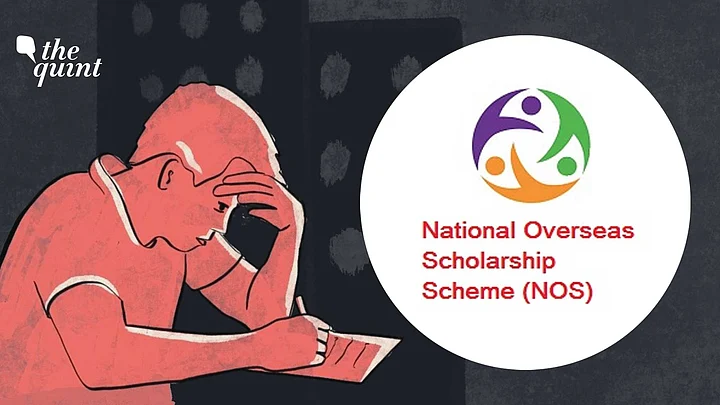For Rahul (name changed), a student from the Scheduled Tribes category, who got an unconditional offer for a PhD in the United Kingdom (UK) to conduct research in the field of social sciences, the National Overseas Scholarship (NOS) was his only hope to be able to afford the education.
But the new scholarship guidelines exclude research topics and courses related to Indian culture, heritage, history, and social studies, leaving many like Rahul feeling dejected.
This exclusionary notification has drawn criticism from the Opposition as well as from the academic community, who say that it is aimed at curtailing voices and ideas of those from marginalised communities in academia.
The new guidelines released by the Ministry of Social Justice and Empowerment on 19 February further added that the final decision as to which topic will be covered under such categories will rest with a selection-cum-screening committee of the NOS.
The scholarship, which was open to aspirants of all subjects prior to this order, was designed to facilitate higher education for low-income students belonging to the Scheduled Castes, de-notified nomadic and semi-nomadic tribes, landless agricultural labourers, and traditional artisans categories.
Why the Scholarship Is Crucial
Many like Rahul are not able to afford the full fee at the institutions abroad. Rahul, who has received an offer from a university, would have to pay approximately Rs 1.2 crore for four years in the UK. His plan rested on the possibility of availing the NOS, which would cover his tuition fee and give him a monthly stipend.
"The day I got an offer from a university was the same day I found out about the new guidelines."Rahul, an NOS aspirant
After the notification left him helpless, Rahul reached out to a senior, an NOS scholar who is now conducting research on a topic that pertains to the culture of his caste. Rahul wanted to conduct research on a topic relating to caste discrimination. On condition of anonymity, he told The Quint,
“Firstly, I will not be eligible for the scholarship anymore. Even if I am, my senior advised me to change my research topic in order to avail the scholarship.”
Students can apply for the scholarship till 31 March.
Dalit scholars who have gone abroad for research come back with "new ideas, a new way of looking at societies and new ways of challenging existing social structures," Jitendra Meena, an Assistant Professor of History in University of Delhi, said, explaining the importance of the scholarship.
“Such scholarships carve out new routes for marginalised sections and open up new possibilities,” he added.
And there is data to back his claim.
N Sukumar, a professor in the Department of Political Science, DU, said that his research has revealed that a majority of Dalit students pursue humanities subjects. He said that in the last few years, many NOS scholars have researched on topics related to caste, specifically on caste discrimination. The move makes it clear that research on caste and inequality will not be encouraged, he added.
"The final call about what topics come under which category rests with a committee. It is important to ask; who then sets the research agenda? And if ministries are going to make decisions like these, does that mean there is no validity for subjective freedom?”N Sukumar, DU Professor
‘Not an Isolated Incident’
Professors said that this move is also linked to the ongoing discussion of caste outside India, which was brewed by the California State University (CSU) decision to add caste as a protected category.
When the CSU, a top university system in the United States with 23 campuses and eight off-campus centres, took the decision, it was hailed as a ‘watershed moment’ by the Dalit community.
Previously, there was not much authorities could do if an instance of caste-discrimination was reported as it did not come under the university’s non-discrimination policy. “Recently, after the California State University highlighted the issue of caste discrimination, people all over the world are discussing it – and India wants it to be hidden,” Jitendra Meena said.
As more and more Dalit scholars make their mark in the international academic community, these issues are brought to the forefront. But the academic community believes that the ruling party wants to quell such discussions.
Ravikant Kisana, an academician who has researched in the field of caste, said that the move needs to be viewed from a historical lens. "This is a much larger pattern and the core issue is that higher education is among the few spaces where there is no scrutiny with regards to caste discrimination,” he said.
Because of the lack of opportunities and access, very few from marginalised backgrounds are hired as professors in renowned universities within India, he added.
The lack of diversity is among the reasons for caste-based discrimination in universities.
This cycle can only be broken if students are given the opportunity of studying abroad, and then hired as professors in Indian universities. In the last few years, this was starting to change, he said. Even then, only 100 students got the NOS scholarships each year.
"There are already so many entry barriers for marginalised students. Firstly, taking GRE or IELTS exams is expensive. Applying for every course costs Rs 6,000-7,000. Students have to apply for multiple courses in order to get admission. I have seen SC and ST students work jobs for years and then save up and then apply to universities. After that, only a few get the scholarship. It has been difficult but we have made it happen."Ravikant Kisana, professor
With more scholars conducting research in the field, the Ambedkarite discourse has come to the fore in the last few years.
But if students do not get opportunities like the NOS, they will not have a voice, and thereby not be hired in higher education institutes, he added.
